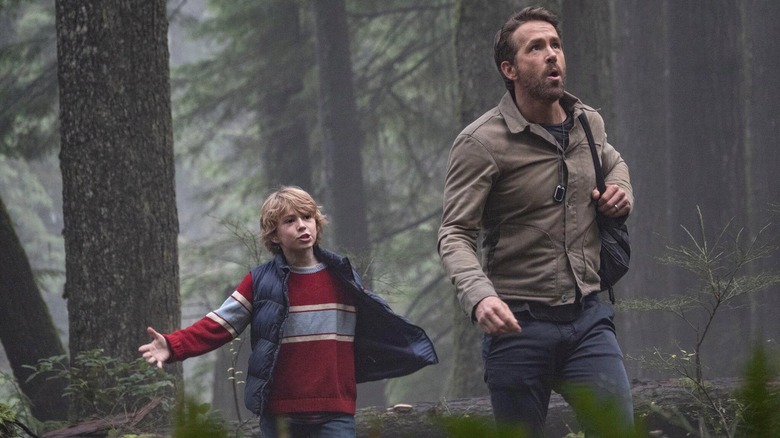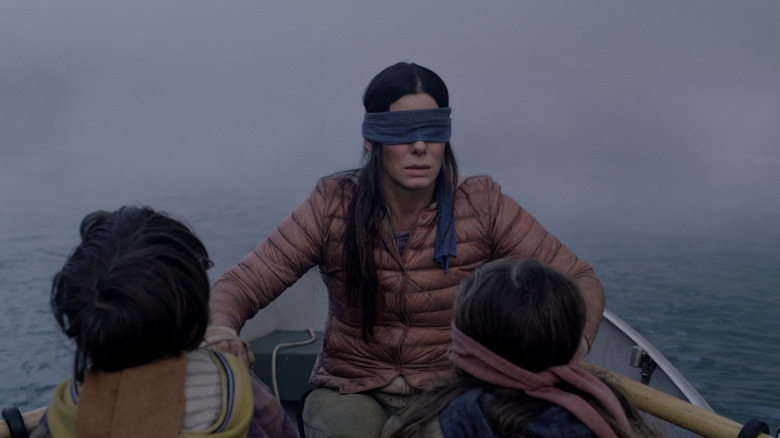Theaters Would Happily Welcome Netflix Movies, And Netflix Should Seriously Think About That
It is absolutely no secret that Netflix has not had the best couple of weeks as a company. The streaming giant posted its first subscriber loss in years and, as a result, its stock price tumbled and the fallout has been ugly. People have been fired, projects have been canceled, and the industry at large has been forced to reconsider its position on doubling down almost entirely on streaming as the future. But what might the future of Netflix be as the company looks to recover? Oddly enough, maybe they should consider making a pivot to wider theatrical releases of big movies.
The notion was put forth at CinemaCon last week. The big industry trade show took place in Las Vegas and, during a press conference, John Fithian, the CEO of the National Asssociation of Theater owners, commented on Netflix's recent troubles. Fithian represents the interests of theater owners in the U.S. and, interestingly enough, he did not make light of things and did not take the opportunity to seem smug. Instead, he suggested movie theaters would welcome Netflix with open arms.
"I represent the movie theater owners but Netflix? We love those guys. [Netflix CEO] Ted Sarandos knows movies and TV better than anyone else in Hollywood. He's crazed about his content... Our door is open for bigger, broader play of Netflix movies if that is a path they want to go down. They're movie fans like we're movie fans."
This statement opens up a pretty compelling discussion about what this might mean, in practice, and whether or not it's something Netflix should truly consider even though their business has been built almost entirely on streaming and streaming alone up to this point.
Netflix's recent troubles
Netflix reported during its recently quarterly earnings call that they lost 200,000 subscribers and expected to lose 2 million in the next quarter. Wall Street did not respond kindly, with the streamer losing $54 billion in value overnight. The stock has not recovered and the company's options to grow subscribers from this point on are limited and, quite frankly, not all that great. Some solutions put forth in that same earnings call included craking down on password sharing which, let's be honest, is going to be wildly unpopular with the average consumer, as well as adding a possible ad-supported option that would be cheaper than what is currently offered.
The other thing to consider is that Netflix probably wants to grow outside of North America but that represents its own set of challenges. That requires spending lots of money on international content that, in many cases, does not travel particularly well. "Squid Game" was an exception and far from the rule. Putting money into international content means taking resources away from North America, where the company is losing subscribers already. It's a robbing Peter to pay Paul situation, in some ways. To put it lightly, they are in a bit of a pickle and some changes need to be made to ensure the company's future as one of the biggest players in the media landscape.
A much-needed revenue stream
What's interesting about Netflix compared to other media companies that have gotten into the streaming game in a meaningful way largely based on Netflix's success is that the streamer to rule them all has very little diversity in its business portfolio. Netflix is a streaming service and mostly only a streaming service. Yes, amazingly enough, they still offer a DVD by mail subscription but that is a drop in the bucket. Yes, they are also getting into video games, but that is in its infancy and it's tough to say if that will prove fruitful. Disney, for example, has a robust physical media business, theme parks, product licensing, and theatrical distribution, amongst many other revenue streams. Disney+, Hulu, and ESPN+ are big parts of the equation but, in the end, Disney has other things to fall back on. Warner Bros. Discovery, ViacomCBS, and NBCUniversal are in similar boats.
Netflix has virtually nothing to fall back on. The company has no backup plan. If they can't get subscriber growth back on track then Wall Street will continue to react poorly and Netflix will lose its place as the king of the hill. One thing they might want to consider is diversifying into other areas of the media business and, as it just so happens, movie theaters have just extended an open invitation to them. Netflix kind of became the enemy of the exhibition business for a number of years but now? It seems like the two might be able to help one another out with a more robust, mutually beneficial relationship.
When Netflix makes a gigantic, $200 million blockbuster like "Red Notice" or the upcoming "The Gray Man," the are relying purely on subscriber dollars to justify that price tag. Now, imagine for a moment if they had an arrangement with theater chains to release those movies in theaters for a number of weeks to generate some meaningful revenue at the box office first before they were made exclusively available to stream on Netflix. Even if they didn't outright turn a profit in theaters, it could be a way to recoup a large chunk of that initial investment before then relying on subscriber interest to generate more revenue.
We've seen examples of streaming and theatrical distribution working hand-in-hand over the past couple of years. "The Batman" had an exclusive 45-day theatrical window, made $760 million at the box office, then became one of the biggest hits ever on HBO Max in its first week on the service. The two ideas don't have to be mutually exclusive. Theaters could get some very attractive content and, in turn, Netflix could get some much-needed revenue to offset the costs of these gigantic productions.
Kinks would need to be ironed out
The ideal version of this sounds nice on paper but, as these disparate business currently exist, some major kinks would need to be ironed out for this to all work in practice. Right now, Netflix largely reserves theatrical releases for awards qualifying runs. They are minimal for the most part and the company doesn't even bother reporting box office figures. These exclusive windows are short, meaning that theaters don't have a lot of motivation to prioritize the movies as viewers are more likely than not going to wait for them to be available from the comfort of home.
What would ultimately need to happen is that Netflix would need to become more flexible in that department. They would need to negotiate meaningful, exclusive windows for these movies before they arrived on the streaming service. The good news is that these windows for big movies have already been downsized quite a bit in the pandemic era. It used to be nearly three months for blockbusters and now? In most cases, 45 days is becoming the new norm at the top end. There is surely a healthy in-between there that Netflix and theater chains could negotiate.
The point is, the global box office is expected to rebound in a big way this year when compared to last year — and 2023 looks even more optimistic. Theaters aren't going anywhere and Netflix's recent troubles have made other media giants reconsider things in regards to theatrical distribution. Netflix would do well to not dismiss this idea out of hand. They say the definition of madness is doing the same thing and expecting a different result. Netflix should try something new and, in this case, maybe that something new is something old.



